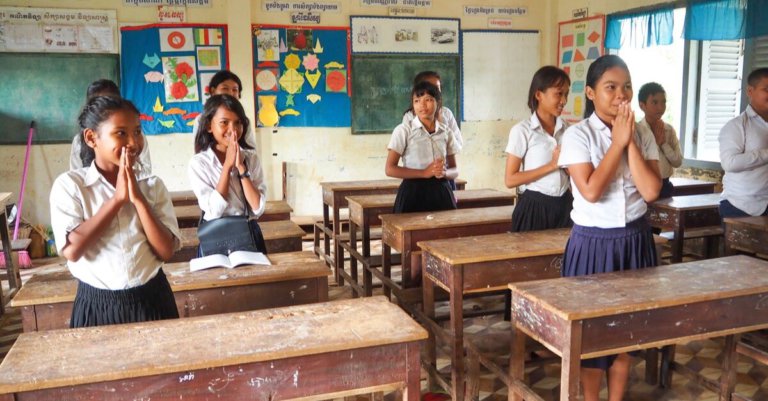
There’s plenty of awareness among youth today surrounding the current climate crisis, thanks to young activists like Greta Thunberg who has inspired others to push for reform.
Schools have been urged to do their part, by not only incorporating sustainability practices in schools, but also educating kids on how to be more environmentally-conscious.
But how many are actually doing so?
In Cambodia, schools really are walking the walk and talking the talk when it comes to sustainability education and practices.
Despite Cambodia having the lowest economic GDP in the ASEAN region (although it is rapidly increasing), they are way ahead in the fight against climate change.
It could be because they are being forced to take action, since the nation is experiencing far worse effects than neighbouring countries.
According to WeForum, “For the second time in four years, school hours had to be reduced across the country, due to record heat waves in the dry season.”‘
Recognising the need for environmental education, the country – supported by the European Union, Sweden, and the United Nations Development Programme – has already integrated climate change and environmental policies into a “new and expanded earth science curriculum” for secondary school students.
#IPCC Bureau member Joy Pereira discusses climate impacts and adaptation with students at Cambodia’s Angkor High School in Siem Reap #climatechange pic.twitter.com/8H8XZlKD8x
— IPCC (@IPCC_CH) May 28, 2019
It will be officially introduced in 2020 where students will learn about the factors that drive climate change and how it’s affecting their country.
They will also learn about “key approaches and technologies, to adapt to the impacts of climate change and to reduce emissions of greenhouse gases,” as reported by WeForum.
That’s not all – the Ministries of Environment and Education have been working jointly to introduce an “eco-school concept” to engage youth and education officials in environmental and climate change issues.
“In 15 pilot schools supported by the Cambodia Climate Change Alliance (CCCA), students benefited from additional teaching on climate change, and worked jointly with teachers on resilience projects such as tree planting and climate-smart agriculture.”
In Cambodia, two-thirds of the population is under 20 years old, due to mass genocide that occurred in the country between 1975-1979, which wiped out a significant percent of the population.
The surviving youth will play a big role in creating eco-friendly, low-carbon solutions for the future, which is why sufficient education is important.
Inspiring story for #WorldEnvironmentDay! #Cambodia has made awareness of climate change + environment a part of its school curricula – and is piloting the concept of eco-schools, with support from @UNDP @EU_Commission and @SweMFA @Sida. #SwedenWeek @UNDPCambodia @NickBeresford2 pic.twitter.com/FLqB3ezHRh
— UNDP Asia-Pacific (@UNDPasiapac) June 5, 2019
It appears the efforts made by the government and ministries to educate the public and youth are paying off, as “recent studies show that 85% of respondents have a basic understanding about the causes of climate change, and 98% can identify some of its impacts.”
There is still more work to be done, however, as 37 percent of those asked were unable to identify any mitigation or adaptation option.
The higher education sector is also taking active measures to combat the climate crisis, as six universities have already begun to incorporate the topic in relevant curricula, and are boosting climate-related research via scholarships and partnerships with international academic institutions.
Other countries in the region and worldwide can take a page from Cambodia’s book, making it a point to educate and engage youth on the climate crisis, so they can be a responsible generation, equipped to come up with sustainable solutions.
Schools in Cambodia are an inspiring model for countries in the ASEAN region who are much more developed and advanced, yet still have not incorporated adequate climate change topics in the school curriculum.
As WeForum aptly writes, “Decisive action over the next few years will be crucial in order to ensure that the 1.2 billion young people who will enter the labour market in developing economies by 2030 – 3 million of them in Cambodia – will be equipped to contribute to and benefit from the job opportunities of a climate-smart economy.”







